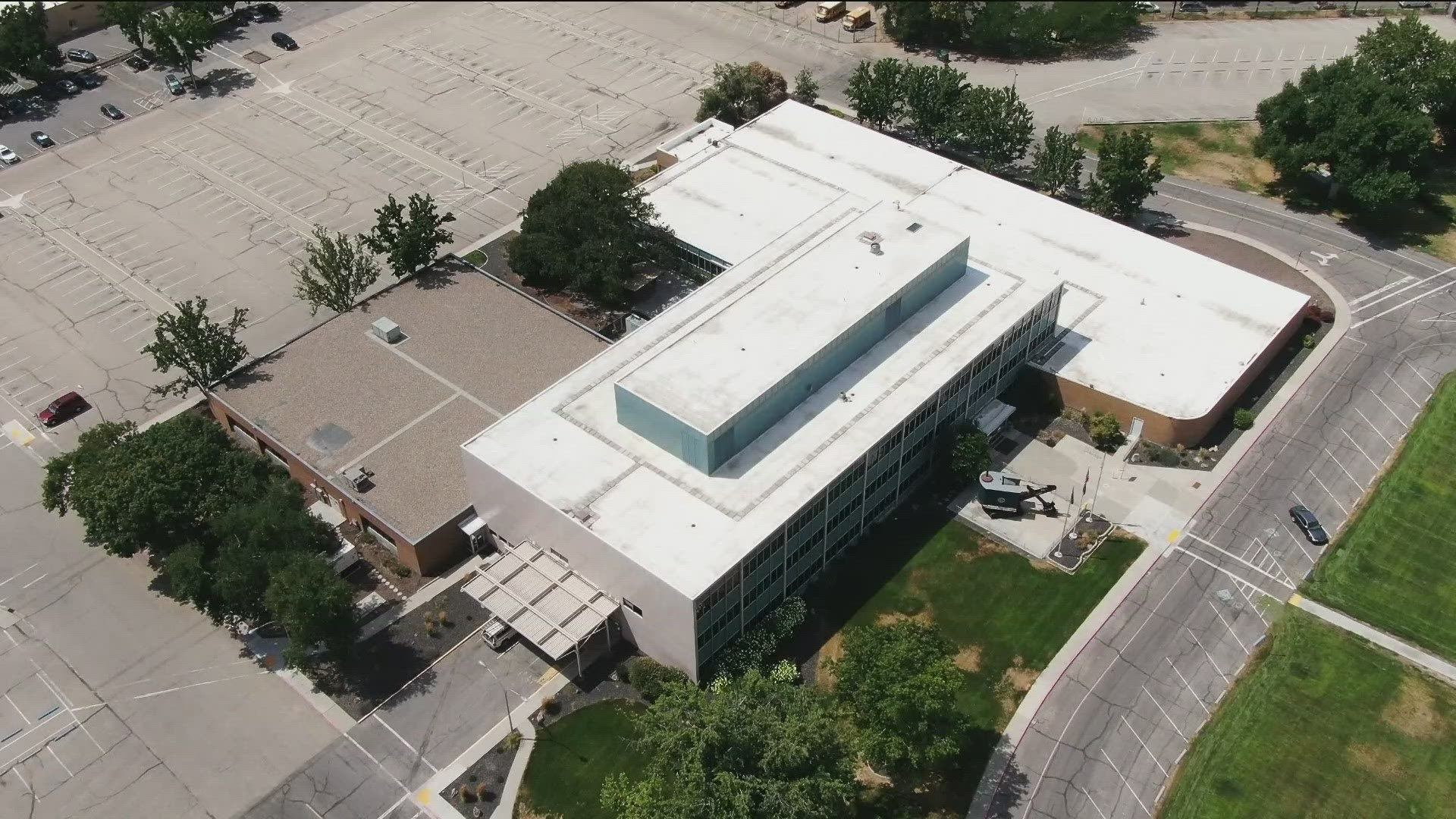BOISE, Idaho —
This story originally appeared in the Idaho Press.
Earlier in July, the Idaho Republican Party proposed adding language to its platform to show support for life-of-the-mother abortion exceptions. Delegates rejected the language in a vote, and the Republican Party Platform, a guiding document for elected officials, will show support for a complete ban on abortions.
The GOP platform previously showed support for a complete ban on abortions. But that was before the U.S. Supreme Court overturned Roe v. Wade about a month ago, allowing states to make their own decisions on how legal or illegal abortion should be.
In a post-Roe world, the Republican Party’s stance was for some anti-abortion activists a strong stance against abortion, which they view as unethical and immoral. And for others, the vote was a confusing signal for a party that is supposedly pro-life.
“I think the position taken at that (Idaho GOP) convention fails to recognize that there really are circumstances in which the mother is at risk,” said David Ripley, executive director of Idaho Chooses Life. “I don’t see how on earth conservatives can propose to say that the state of Idaho should be in a position of mandating the death or destruction of that mother by the criminal code.”


Ripley, who has worked in anti-abortion activism for decades, said he appreciated that many of the Republican delegates felt very passionately about stopping abortions and the vote represented their righteous anger, but that such a position is unworkable and would put doctors in impossible situations.
“I think it’s frankly not just wrong. I really think that’s an immoral position,” Ripley said. “Women are people too, right? I’m like ‘Hello, this is crazy.’”
Ripley also pointed to ectopic pregnancies, when the fertilized egg plants itself outside the uterus, often in the fallopian tubes. The pregnancy is not viable. The fallopian tube can rupture and the woman will begin hemorrhaging internally, he said. A law that wouldn’t save the mother’s life in instances like that is “crazy,” Ripley said.
“You can’t save the baby and you’re going to condemn the women to death,” Ripley said. “I don’t understand how anybody can claim that’s pro-life.”
Idaho currently has three exemptions in its abortion trigger law: For the life of the mother and for rape or incest, but only if the patient can provide a police report. That law is the “gold standard,” Ripley said. He believes the language at the convention doesn’t speak for the bulk of Republicans or pro-life people.
It’s unclear how much political support removing those exemptions would have. For example, Lt. Gov. Janice McGeachin in May called on Gov. Brad Little for a special session to remove those exemptions.
However, both sides of the abortion debate immediately objected, with abortion rights backers calling it “unthinkable” and anti-abortion activists saying Idaho’s trigger law already is the strongest in the nation, the Idaho Press previously reported.
Sen. Todd Lakey, R-Nampa, co-sponsored Idaho’s abortion trigger law. He said he’s also happy with the legislation and thinks the life of the mother is an appropriate exception.
“There’s two lives,” Lakey said. “If you have to choose between one or the other, that’s an individual and a family decision.”
In the meantime, different abortion laws in Idaho are set to take effect in August, though Planned Parenthood has filed three lawsuits against those laws. In court filings, Planned Parenthood said the six-week abortion ban is likely to go into effect on Aug. 19, according to the Associated Press.
Ripley and Lakey said they are both looking at potentially expanding a support network for mothers, babies and adoption during this “huge transition,” after the trigger law goes into effect.
Idaho’s trigger law will automatically go into effect around Aug. 25.
Legality
If the party platform were to become law, it would fly in the face of the constitution and federal law, said Kim Clark, legal director for Legal Voice.
The original 1973 abortion supreme court case, Roe v. Wade was based on the due process clause of the 14th Amendment. The clause said, “nor shall any State deprive any person of life, liberty, or property, without due process of law.”
“The reason the court overturned Roe is because this concept of liberty is, in the court's mind, vague. There’s always been debate over what liberty encompasses,” Clark said. “There isn't a lot of debate about what life means.”
Essentially, a provision removing exceptions for life of the mother “sentences pregnant people to death” in the event of any complications, she said. Plus, maternal deaths are more common in minority communities. Minority women could be disproportionately harmed by this kind of provision.
There’s also a federal law requiring hospitals to provide emergency medical treatment regardless of whether the person can pay, which Clark said also relates to any potential provision removing exemptions for the life of the mother.
Not saving the life of the mother would defy medical ethics, she said, as well as intrude upon the doctor-patient relationship.
“From a common sense standpoint, it really makes no sense whatsoever. If the pregnant person dies, the fetus dies as well,” Clark said. “The one purpose it does serve is to garner votes.”
Clark said there are concerns that even with the exception, pregnant women are not receiving appropriate care.
In Texas, for example, a study of two hospitals showed that women facing complications before fetal viability suffered because they couldn’t end their pregnancies, the New York Times reported. The majority of patients required care because their water broke early, according to the study.
Around 57% of the 28 patients in the Texas study had a serious maternal morbidity, such as hemorrhage, according to the study. In states without Texas’ six-week abortion ban, around 33% of those who ended their pregnancies had a serious maternal morbidity.
All but one of the 28 patients lost the fetus or baby. Eight had “cardiac motion” at birth — but seven died within a day and the final baby remained hospitalized at the time of the study.
Some hospitals have waited until after the mother comes in with serious symptoms, like sepsis or acute kidney injury, before ending the pregnancy, instead of acting when water breaks early. Essentially, medical care is being provided after an event like an infection, rather than before when the women risk infection.
What to expect when you’re expecting
Pregnancy can be an exciting, emotional experience for many people. But there can also be risks. However, there are ways to reduce the risk of any complications. When navigating pregnancy, expecting parents can get bombarded with confusing and contradictory information, so the Idaho Press reached out to a doctor to find out what pregnant women should know.
Here are some of the risks and what women who are expecting, pregnant or have given birth should look out for.
“A lot can go wrong. Thank goodness most of the time it doesn’t happen,” said Don Dyer, Idaho College of Medicine assistant professor and clinical director of women’s health. “Pregnancy definitely carries risks.”
For instance, a woman’s immune system is suppressed during pregnancy, which means she is more at risk for various infections. And as pregnancy progresses, there’s a higher risk for developing high blood pressure problems like preeclampsia.
There’s also a higher instance of gestational diabetes, which is diabetes that is newly diagnosed during pregnancy.
“Pregnancy stresses the body pretty much to its maximum and the reason that most pregnancies turn out well is because most women who are pregnant are younger,” Dyer said. “When we’re younger, our bodies tolerate more and recover faster.”
Women who are 35 years and older are at higher risk for certain problems. Those issues include chromosomal problems in the baby, like preeclampsia and gestational diabetes. The risk is higher for women aged 40 and older.
However, both very young women in their teens and people having their first child also are at higher risk for preeclampsia, which is a high blood pressure situation that can have severe consequences for the mother. If left unchecked, there’s a high risk of the mother having a stroke or other serious medical issues.
Though it is not known for sure what exactly about pregnancy can trigger preeclampsia, the only cure is delivering the baby.
There are ways to manage the risk, Dyer said.
No. 1 is talk to a doctor before getting pregnant. It’s important to identify any health risks the patient has prior to pregnancy. The patient can then potentially mitigate those issues, for example by quitting smoking.
Another helpful precaution is prenatal care, early and throughout pregnancy, which can help doctors identify problems as they may occur. Over half of all maternal deaths are associated with some problem with hypertension during pregnancy, which is why good prenatal care and close supervision later in pregnancy can help.
“You want to pick that up early,” Dyer said.
Childbirth can also bring its risks. One high cause of maternal death is postpartum hemorrhage, which is when the uterus doesn’t contract well after the baby delivers.
“All muscles can be taken to the point they fatigue, so if you have a real long labor or a really big baby … the uterus may be fatigued,” Dyer said. “If the uterus doesn’t contract adequately, the mother will lose a lot of blood. You can lose so much blood that you literally bleed out.”
However, this does not happen too often in the United States, Dyer said, because there are available medications to force the uterus to contract.
Other times, a woman can become septic, which is a life-threatening infection. After a woman gives birth, a huge area in the vagina, cervix and uterus are potentially open to infection, Dyer said.
However, there are symptoms women who are pregnant or who have given birth can look for: Excessive bleeding and fever are two, but any fever or pain should be evaluated. Women who are nursing should look for excessive breast pain or swelling, which can signal an infection.
“Pregnancy is not totally benign,” Dyer said. “The majority of the time things do work out well.”
Carolyn Komatsoulis covers Boise, Meridian and Ada County. Contact her at 208-465-8107 and follow her on Twitter @CKomatsoulis.
This story originally appeared in the Idaho Press. Read more at IdahoPress.com.
Watch more Local News:
See the latest news from around the Treasure Valley and the Gem State in our YouTube playlist:



